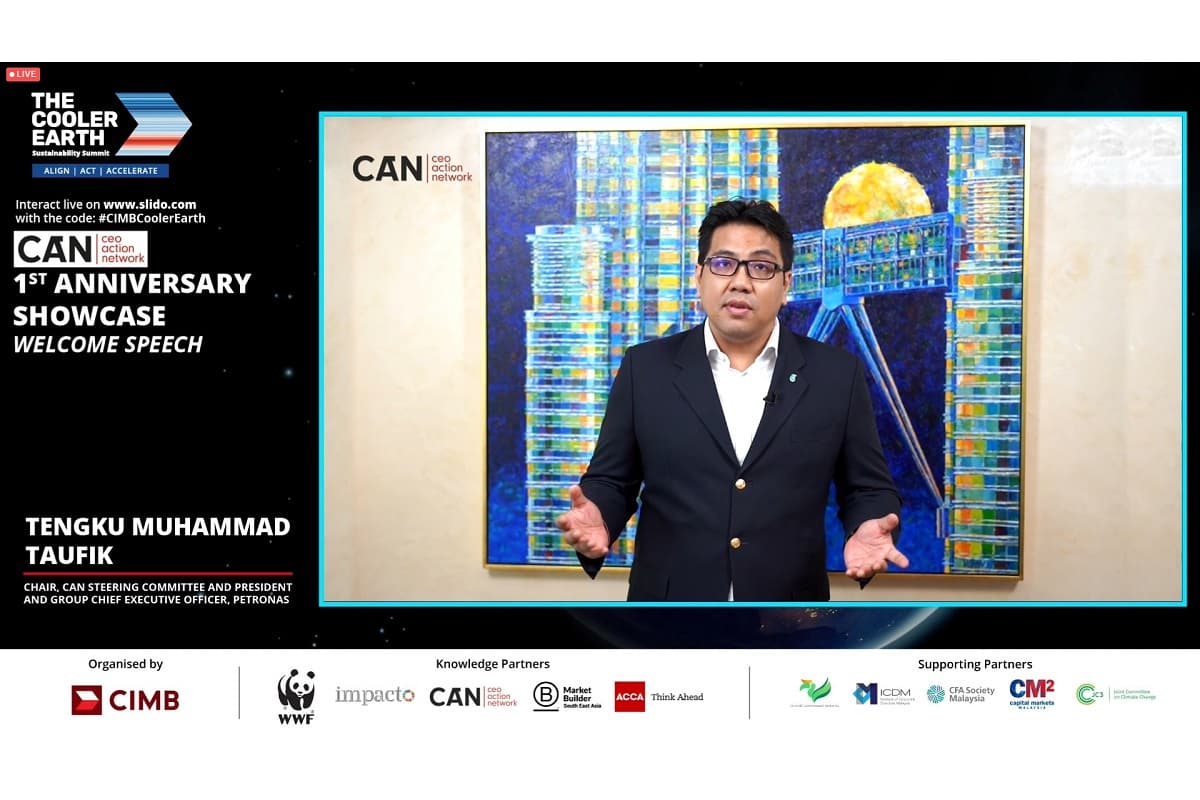
KUALA LUMPUR (Sept 23): CEO Action Network (CAN), the country's first sustainability-focused informal coalition of leading chief executive officers (CEOs) and senior decision makers, today announced its collective environmental, social, and corporate governance (ESG) commitments for 2023.
This comes ahead of the UN Climate Change Conference (COP26) in Glasgow in November.
CAN said the commitments, which were made official during the coalition's first anniversary event, will be critical to enabling the country to achieve the goal of a net zero carbon emissions in the future.
They will also be pivotal to accomplishing the aspirations of Malaysia's shared prosperity vision by 2030, CAN said in a statement.
Petroliam Nasional Bhd (Petronas) president and group CEO Tengku Muhammad Taufik, who is also CAN chairperson of the steering committee, said that businesses today have no choice but to respond to the need for greater sustainability in the face of a potential climate disaster.
"This unprecedented period presents many untapped opportunities to develop and offer new solutions to the market that will contribute positively to society and the environment. Progress in this area will require collective and transformative action from all stakeholders.
"These must be actions that enable the shaping of policy-driven environment that prompts collective efforts to develop solutions towards a more sustainable future. This is where CAN hopes to play a role," he said.
He added that the CAN offers a unique platform for CEOs to deliberate on the material issues shaping the future survival and growth of their businesses, while providing motivation to take definitive action to combat systemic issues.
Luanne Sieh, the head of group sustainability at CIMB Group, who is also the chair of the working group of CAN, said the collective commitments have been designed to challenge CAN members at various levels of sustainability maturity to commit to the next step of sustainability progress.
She said CAN's working group is actively collaborating with members and partners to curate content and plan activities that will help member organisations build their knowledge, capacity and skills to progressively move to advanced levels of sustainability adoption and integration.
"Regular, open and transparent exchanges and knowledge sharing between all our members and stakeholders are crucial to raise awareness and generate momentum for climate action," she added.
To support these commitments from businesses, CAN has partnered with Climate Governance Malaysia to organise a series of 15 roundtable discussions on Net Zero Pathway Ambition, with more than 2,000 participants, covering critical sectors such as energy, agriculture & plantations, property & construction, and telecommunications, among others.
Datin Seri Sunita Rajakumar, chairperson of Dutch Lady Milk Industries Bhd and the lead of the policy advocacy workstream of CAN, said the public-private collaboration can play a critical role in unlocking new opportunities and solving existing challenges.
To accelerate change particularly in the area of sustainable development, she urged business leaders across the public and private sectors to work together.
Meanwhile, CAN members are also creating purposeful and practical peer-sharing and learning modules on various aspects of sustainability, including climate change, energy management, labour relations and waste & water, amongst others.
The idea is to facilitate the exchange of best practices and learning amongst members, help build internal capacity and leave no one behind as the ecosystem for responsible businesses and business practices evolves in the country and regionally. A series of supplier and SME training sessions on these sustainability topics are also being planned for late 2021.
PwC's Southeast Asia climate change leader Andrew Chan, who is also the lead of the capacity building workstream of CAN, said CAN's continuing aspiration is to allow members to not just learn from each other, but to also uplift sustainability capacity in the supply chains and business ecosystems, by building ESG knowledge and skills in the context of business, resilience and growth.
"To date, more than 500 practitioners from CAN member organisations have attended the modules. We plan to extend these to small and medium enterprises in our members' supply chains over the next one year, as it is critical for businesses to look beyond their own operations and manage their indirect impacts on the environment and society," Chan shared.